News 2024
Un grupo de investigación del Instituto de Biología
Funcional y Genómica, centro mixto del Consejo Superior de Investigaciones Científicas (CSIC) y
la Universidad de Salamanca, ha identificado un mecanismo molecular crucial para la
supervivencia celular en condiciones de estrés nutricional, arrojando nueva luz sobre procesos
relacionados con la longevidad y el envejecimiento celular.
En los organismos vivos, las células alternan entre estados de división activa y quiescencia, un estado de reposo en el que no se dividen. Durante la quiescencia, las células pueden
mantenerse viables durante largos periodos gracias a la síntesis de proteínas esenciales para su supervivencia. Según el estudio, publicado en la revista Nature Communications, los genes que codifican estas proteínas presentan una característica singular: un alto contenido de codones AAA.
Los codones son tripletes de nucleótidos presentes en el ARN mensajero (ARNm) que los
ribosomas traducen para sintetizar proteínas. El aminoácido lisina está codificado por dos
codones distintos, AAA y AAG. Mientras que la traducción del codón AAG es eficiente, la del
codón AAA es menos efectiva debido a una interacción más débil entre este codón y el
anticodón UUU en el ARN de transferencia (ARNt). Este fenómeno es especialmente relevante
en células quiescentes sometidas a estrés nutricional, donde los niveles de ARNm y ARNt están notablemente reducidos.
El estudio muestra que modificaciones químicas específicas en una de las tres uridinas del
anticodón UUU del ARNt estabilizan la interacción con los codones AAA. Estas modificaciones
aumentan significativamente la eficiencia de la traducción de los ARNm que utilizan
predominantemente codones AAA frente a AAG, asegurando así la producción de proteínas
esenciales en condiciones de escasez de nutrientes.
Este avance arroja luz sobre los mecanismos moleculares que permiten a las células sobrevivir en condiciones de estrés nutricional, un proceso que ha sido vinculado a una mayor longevidad celular. Este descubrimiento abre nuevas posibilidades para entender las bases moleculares de la longevidad y desarrollar estrategias para mitigar los efectos del envejecimiento.
Artículo Científico en el siguiente enlace.
Noticia en DICYT en el siguiente enlace.
Noticia en Salud a Diario en el siguiente enlace.
Diciembre, 2024
IBFG research groups led by Drs Pedro San Segundo, Alfonso Fernández Álvarez and Cristina Martín Castellanos have recently participated in the annual meeting of the Spanish Meiosis Network 2024 (17-19 June 2024, El Escorial, Madrid). This meeting has been held annually since 2014 and brings together groups working on various aspects of meiosis using different model systems from yeast to humans.
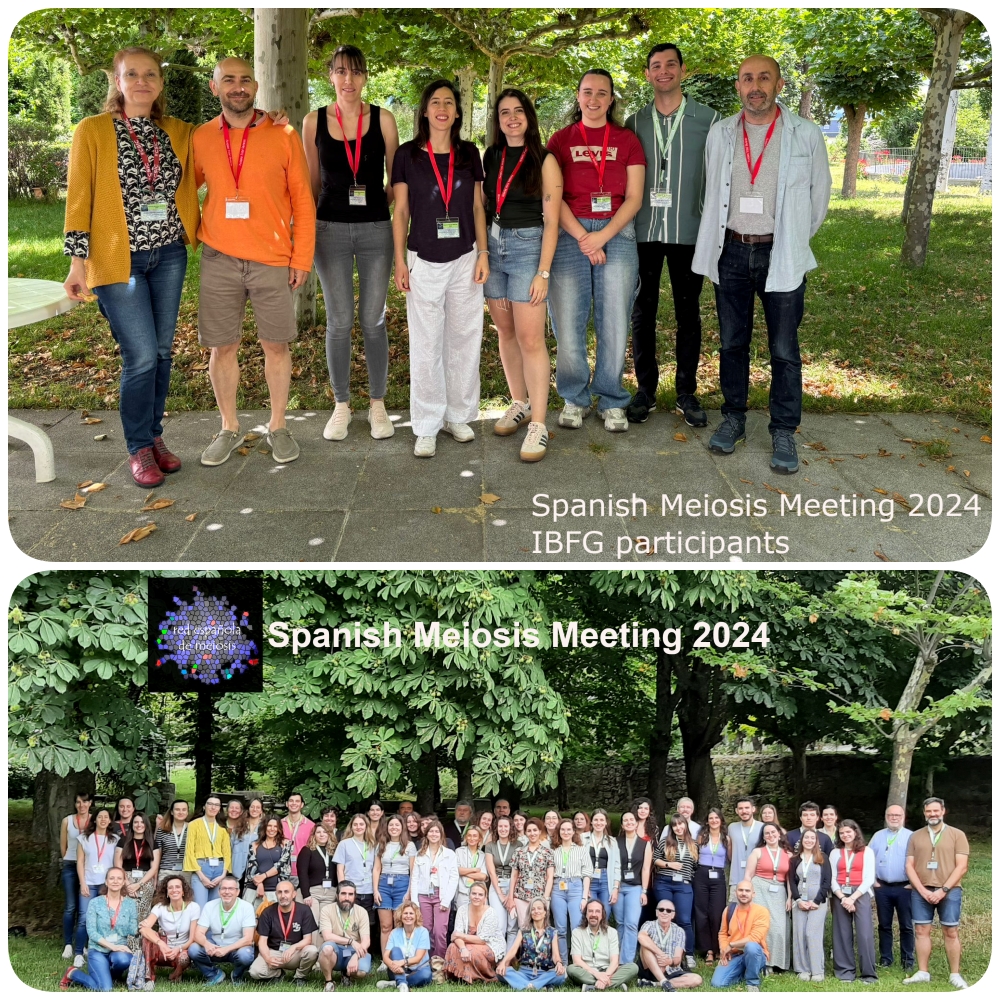
July, 2024
The Centro de Soluciones Empresariales de Arroyo de la Encomienda, in Valladolid, hosted on 12 June at 19:00 the gala of the Innovadores awards of the newspaper EL MUNDO DE CASTILLA LEÓN.
Fourteen outstanding individuals and institutions in research and innovation received awards. Álvaro Sánchez and Ángeles Almeida, part of the Institute of Functional Biology and Genomics (IBFG), were awarded for their outstanding work in research and innovation in Castilla y León. Sánchez was recognised for his work in Zamora, while Almeida received her award for her contributions in Salamanca. Their efforts have had a significant impact in their respective areas, highlighted at the big innovation party organised by EL MUNDO DE CASTILLA Y LEÓN.
El Mundo Castilla y León Website in the following link.
June, 2024
The journal Nature Metabolism has published a study by a research group led by Juan Pedro Bolaños, professor in the Department of Biochemistry and Molecular Biology. This work represents a significant advance in the understanding of how the brain works.
The results contribute to the search for pharmacological strategies to prevent aberrant activation of glycolysis in neurons, a phenomenon that occurs in neurodegenerative diseases.
USAL Press New in the following link.
Salud a Diario New in the following link.
May, 2024
Dr. Álvaro Sánchez's research team demonstrates that, as in genetics, there are mathematical rules that govern the behaviour of ecosystems.
This study has used predictive models that capture patterns of "global epistasis" (a phenomenon in which the expression of one gene is affected by the expression of other genes), widely documented in genetics. Applying these models to ecosystems facilitates quantitative interpretation of ecological function through pairwise interactions between community members.
CSIC Website article in the following link.
DICYT new in the following link.
iLeon new in the following link.
May, 2024
Under the call for extraordinary grants for the Development of Excellence Strategies of the MaX-CSIC 2024 Project (DEEP-MaX-2024), the IBFG has been accredited with the ASPIRA-MaX Josefa Barba Seal of Excellence..
This accreditation involves a financial endowment of €20,000 for the development of a scientific project proposal and excellence plan, subject to monitoring and interim evaluation.
DICYT news in the following link.
Salamanca24horas news in the following link.
May, 2024
Interview with Dr. Álvaro Sánchez in the Diario de Valladolid after joining the IBFG with the European Research Council (ERC) project..
Diario de Valladolid New in the following link.
April, 2024
The latest issue of the SEBBM journal includes a review of an article in Cell Reports by Dr. Francisco Antequera's group in 2023.
SEBBM article in the following link.
April, 2024
The University of Salamanca is organizing an outstanding Biophysics course for the first week of July 2025, with the purpose of supporting the institution's researchers and research groups in the identification of new strategic areas in the field of biophysics and structural biology. This course aims to attract and encourage the incorporation of scientific talent. The initiative is supported by renowned researchers from the University of California, Berkeley, such as Evangelina Nogales and Carlos Bustamante.
The course has an advisory board composed of the two co-directors, Professors Evangelina Nogales and Carlos Bustamante, as well as professors from the University of Salamanca belonging to the Institute of Functional Biology and Genomics (IBFG), the Cancer Research Center (CIC), the Institute of Neurosciences of Castilla y León (INCyL) and the Department of Applied Physics..
Article of the course in the following link.
Abril, 2024
Next Wednesday, April 17, Bruno Gonzalez-Zorn, WHO advisor on antibiotic resistance, will give a talk on the problem of antibiotic resistance from the perspective of "One Health". This event, which will take place at 5:30 pm in the auditorium of the Dioscorides building of the Faculty of Biology, will be open to the public and, in addition, broadcast in Streaming through the instagram account @micromundoUSAL. The talk is part of the closing of the MicroMundo 2024 project coordinated in Salamanca by the Institute of Functional Biology and Genomics (IBFG). MicroMundo is an international research initiative that seeks antibiotic-producing microorganisms and awareness of resistance to these compounds. The results obtained in 2024 in Salamanca will be presented during the conference.
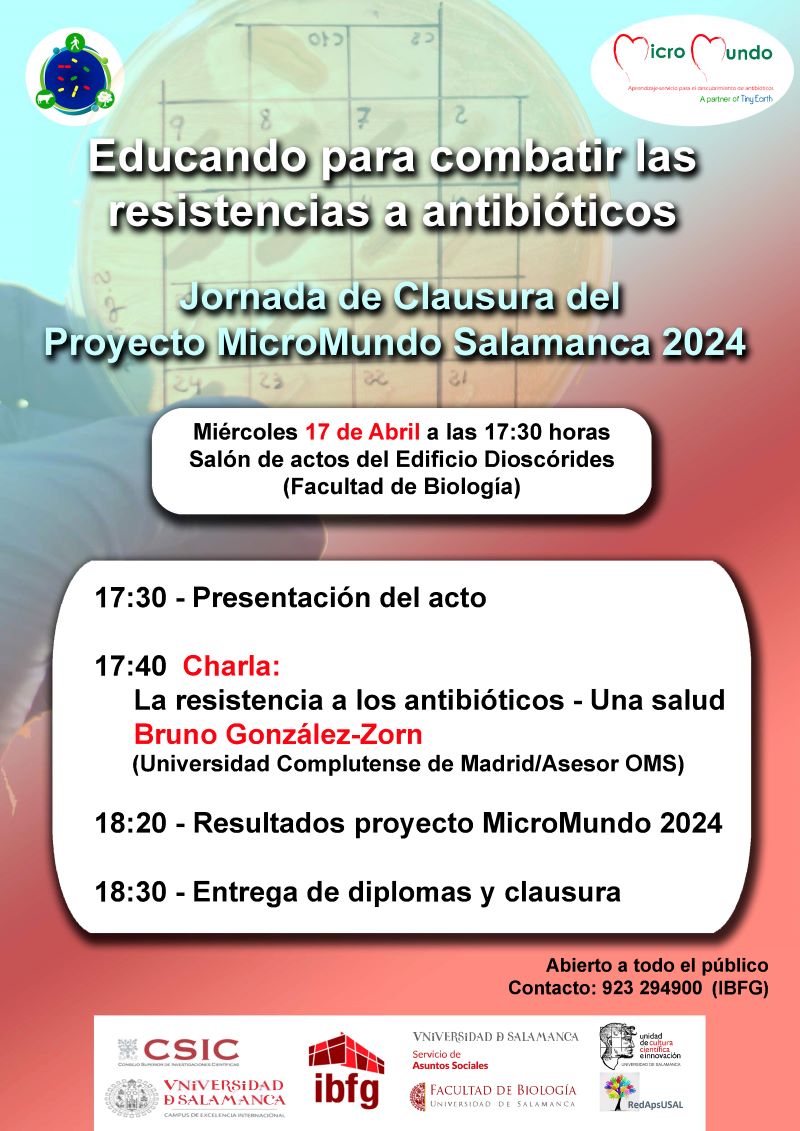
Web News in Tribuna Salamanca here.
March, 2024
The Women & Science group of the Spanish Society of Biochemistry and Molecular Biology (SEBBM) was created in 2021 with the aim of establishing a meeting point to carry out initiatives that contribute to improving the visibility of women in science, as well as to discuss about gender biases and barriers that penalize the advancement of women in research careers.
The Women & Science group of the Spanish Society of Biochemistry and Molecular Biology (SEBBM) studies gender stereotypes in science through a drawing contest.
Contest Web here.
March, 2024
The newspaper INNOVASPAIN publishes an article on its website about the MicroMundo Project. Citizen science project to fight against antibiotic resistance.
INNOVASPAIN article in the following link
Marzo, 2024
ICAL Agency celebrated its thirty-fifth anniversary renewing its commitment to service with rigor and quality information in Castilla y León. ICAL Agency recognizes the research activity of Cristina Viéitez, IBFG researcher, by awarding the ICAL 2024 Award for her contribution to female leadership in science and her example and concern for removing obstacles so that new generations can be free to pursue their professional aspirations without limitations imposed by reasons of gender, origin or culture.
InfoBierzo article in the following link
ElBierzoDigital article in the following link
Tribuna Salamanca article in the following link
La Razón article in the following link
La Junta de Castilla y León article in the following link
March, 2024
Article in the Gaceta de Salamanca entitled "MicroMundo llega al IES Francisco Salinas" (MicroWorld arrives at IES Francisco Salinas) explaining the Learning/Service project in which high school students, guided by scientists from CSIC and students and professors from the University of Salamanca, search for new antibiotics. .
March, 2024
El proyecto MicroMundo trabaja para dar a conocer esta problemática y concienciar a la población. Este proyecto internacional de “ciencia ciudadana” tiene como objetivo principal la búsqueda de microorganismos productores de nuevos antibióticos a partir de la biodiversidad de los suelos de todo el planeta. MicroMundo, además, busca fomentar la vocación científica en jóvenes estudiantes, tanto en universitarios como en alumnos de secundaria y bachillerato, así como divulgar el problema de la crisis antibiótica, que supone una línea prioritaria en Salud Pública, tanto de la Organización Mundial de la Salud (OMS) como de la Asamblea General de las Naciones Unidas.
El Proyecto MicroMundo en Salamanca, coordinado desde el Instituto de Biología Funcional y Genómica (IBFG, CSIC/USAL), comienza su séptima edición con participación de alumnos universitarios, alumnos y profesores de centros educativos y ciudadanos. En ediciones anteriores ya han participado 20 centros educativos, 108 estudiantes universitarios y 422 alumnos de Secundaria y Bachillerato.
Este proyecto está bajo la supervisión de dos profesoras de la Facultad de Biología, Beatriz Santos y Margarita Díaz, y de dos investigadores del CSIC, Ramón Santamaría y Carlos R. Vázquez de Aldana, todos pertenecientes al IBFG. En el proyecto también están implicados 21 alumnos universitarios del grado en Biología y 5 alumnos predoctorales del IBFG. Durante este curso alumnos de IES Francisco Salinas, Colegio San Agustín, IES Martínez Uribarri, IES Senara (Babilafuente, Salamanca) y un grupo de adultos pertenecientes al barrio de Pizarrales y a la asociación Asprodes participarán en el proyecto.
La actividad en los institutos se llevará a cabo entre el 23 de febrero y el 21 de marzo. Posteriormente habrá una jornada general de concienciación a la sociedad el 17 de abril donde se expondrán los resultados del proyecto.
Colaboran IBFG, CSIC, UCCi (USAL), Facultad de Biología y Servicio de Asuntos Sociales (USAL). Esta edición está financiada por un proyecto de Aprendizaje-Servicio de la USAL.
New in Tribuna Salamanca newspaper in the following link
New in Salamancartvaldia newspaper in the following link
New in Salamanca24horas newspaper in the following link
RadioUSAL interview in the following link
Febrero, 2024
Next Tuesday, 27th February 2024, the presentation of the project "THE HUMAN CONDITION FROM ART AND GENETICS" will take place in the Aula Magna of the Faculty of Arts of the University of Salamanca, financed by the Spanish Foundation for Science and Technology (FECYT), dependent on the Ministry of Science and Innovation.
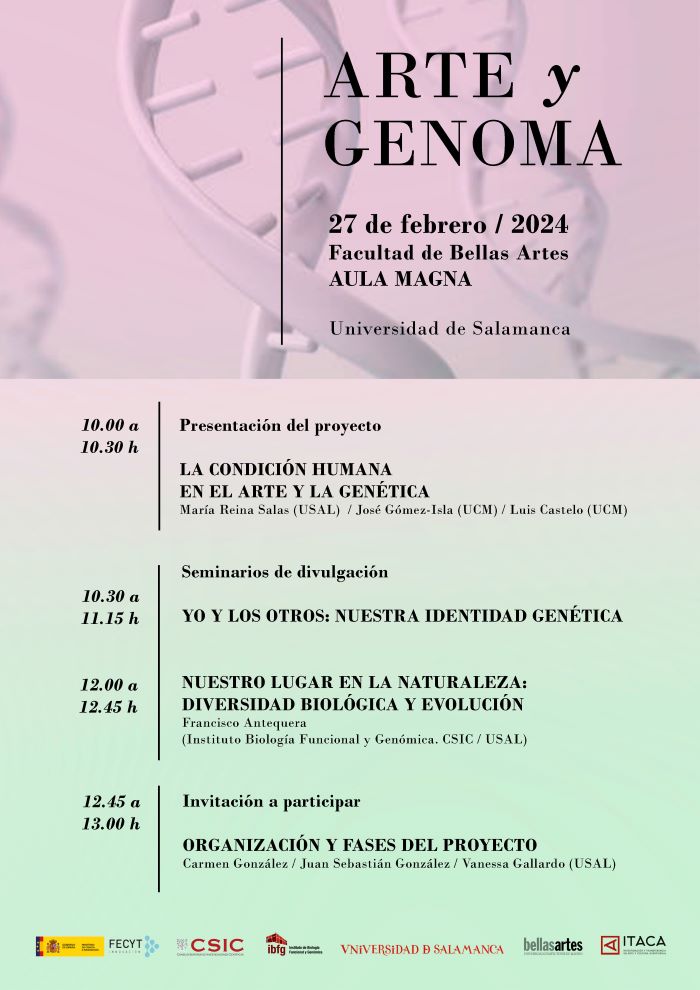
February, 2024
A unique family experience awaits you!
This exciting activity is designed for the whole family and is divided into two equally captivating parts. Parents will have the opportunity to take part in fascinating talks with some of the IBFG's brilliant researchers. They will be able to immerse themselves in enriching conversations on a variety of scientific topics over a cup of coffee.
Meanwhile, the youngest members of the family will enjoy an attractive scientific Storyteller specially designed for them. Through curious and exciting stories, children will explore the world of science in a fun and educational way.
Designed for girls and boys aged 4-8 years (recommended age, not exclusive).
Join us on this adventure for the whole family and discover the fascination of science in a unique and exciting way! Limited places available!
IMPORTANT: at least one party (parent) must attend the Coffee with Scientists. Children are not allowed to be left in the building.
REGISTRATION in the following link.
The activity will take place at the IBFG, Calle Zacarías González, nº2, 37007, Salamanca.

Febrero, 2024
Next Monday, February 12 at 11:30 am and on the occasion of the International Day of Women and Girls in Science, we invite you to participate in the event "A hombros de gigantas", which will consist of 2 short talks and a round table.
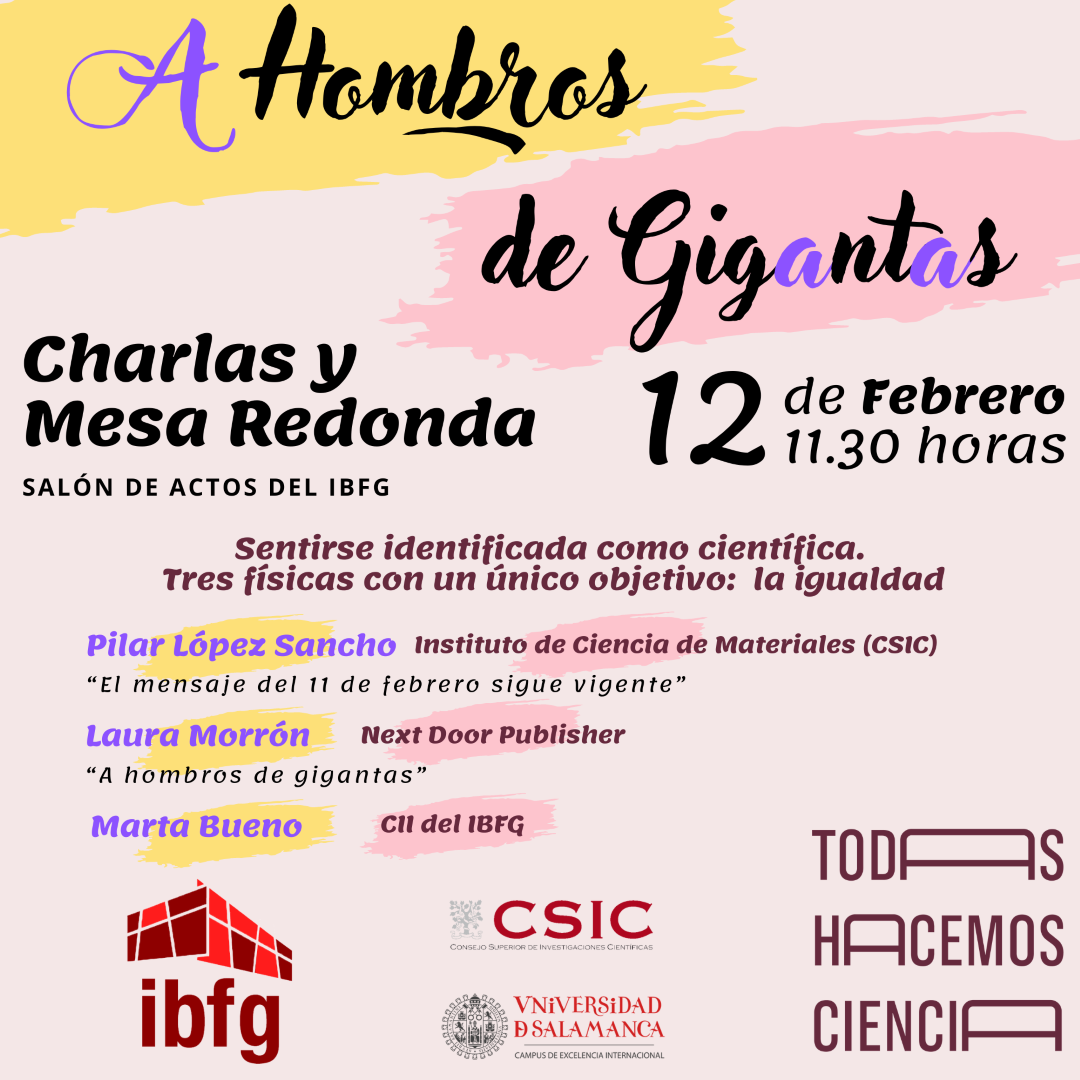
February, 2024
The IBFG reaffirms its commitment to the "International Day of Women and Girls in Science" by carrying out activities during the months of February and March. Join us and enjoy with us the science done and told by our female scientists.
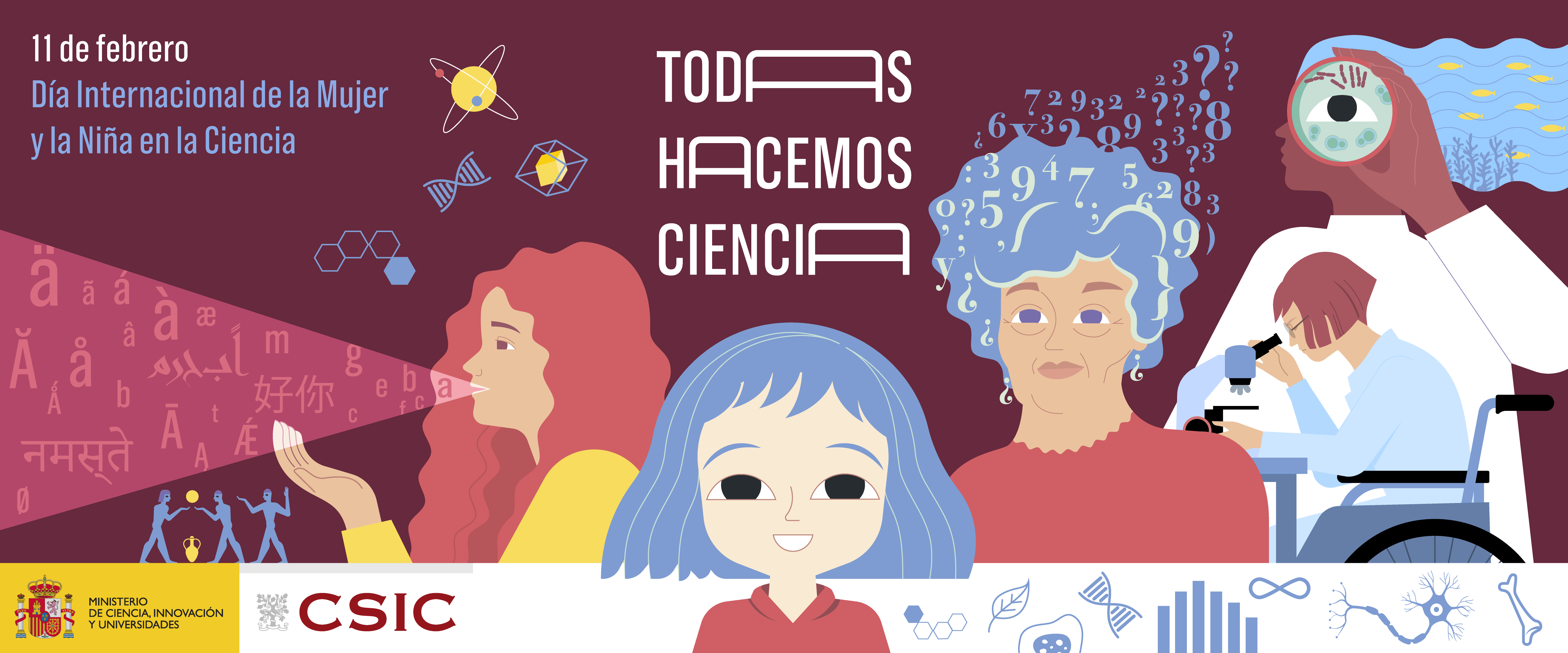 In the following link you will be able to see all the activities scheduled by the IBFG:
In the following link you will be able to see all the activities scheduled by the IBFG:
DICYT New in the following link
Salamancartvaldia New in the folowing ling
February, 2024







